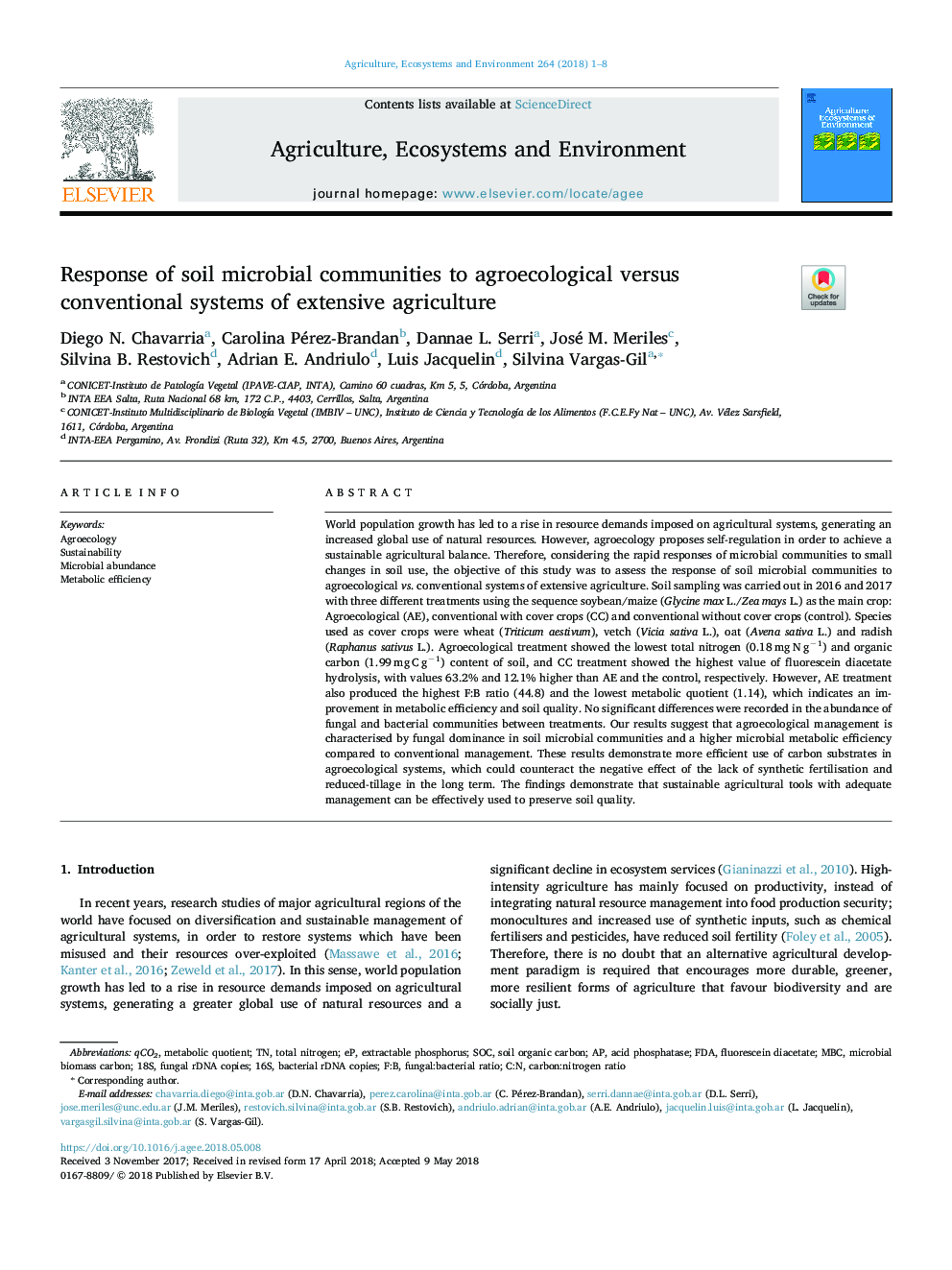| کد مقاله | کد نشریه | سال انتشار | مقاله انگلیسی | نسخه تمام متن |
|---|---|---|---|---|
| 8487015 | 1551988 | 2018 | 8 صفحه PDF | دانلود رایگان |
عنوان انگلیسی مقاله ISI
Response of soil microbial communities to agroecological versus conventional systems of extensive agriculture
ترجمه فارسی عنوان
واکنش جوامع میکروبی خاک به سیستم های کشاورزی زراعی در مقایسه با سیستم های معمول کشاورزی
دانلود مقاله + سفارش ترجمه
دانلود مقاله ISI انگلیسی
رایگان برای ایرانیان
کلمات کلیدی
MBCFDAqCO216S18SC:N - C: Nacid phosphatase - اسید فسفاتازMetabolic efficiency - بازده متابولیکfluorescein diacetate - دی فسفات فلورسینAgroecology - زراعت زراعتSOC - سیستم روی یک تراشهMetabolic quotient - فاکتور متابولیکMicrobial abundance - فراوانی میکروبیtotal nitrogen - نیتروژن کاملSustainability - پایداریSoil organic carbon - کربن آلاینده خاکmicrobial biomass carbon - کربن زیست توده میکروبیCarbon:nitrogen ratio - کربن: نسبت نیتروژن
موضوعات مرتبط
علوم زیستی و بیوفناوری
علوم کشاورزی و بیولوژیک
علوم زراعت و اصلاح نباتات
چکیده انگلیسی
World population growth has led to a rise in resource demands imposed on agricultural systems, generating an increased global use of natural resources. However, agroecology proposes self-regulation in order to achieve a sustainable agricultural balance. Therefore, considering the rapid responses of microbial communities to small changes in soil use, the objective of this study was to assess the response of soil microbial communities to agroecological vs. conventional systems of extensive agriculture. Soil sampling was carried out in 2016 and 2017 with three different treatments using the sequence soybean/maize (Glycine max L./Zea mays L.) as the main crop: Agroecological (AE), conventional with cover crops (CC) and conventional without cover crops (control). Species used as cover crops were wheat (Triticum aestivum), vetch (Vicia sativa L.), oat (Avena sativa L.) and radish (Raphanus sativus L.). Agroecological treatment showed the lowest total nitrogen (0.18â¯mgâ¯Nâ¯gâ1) and organic carbon (1.99â¯mgâ¯Câ¯gâ1) content of soil, and CC treatment showed the highest value of fluorescein diacetate hydrolysis, with values 63.2% and 12.1% higher than AE and the control, respectively. However, AE treatment also produced the highest F:B ratio (44.8) and the lowest metabolic quotient (1.14), which indicates an improvement in metabolic efficiency and soil quality. No significant differences were recorded in the abundance of fungal and bacterial communities between treatments. Our results suggest that agroecological management is characterised by fungal dominance in soil microbial communities and a higher microbial metabolic efficiency compared to conventional management. These results demonstrate more efficient use of carbon substrates in agroecological systems, which could counteract the negative effect of the lack of synthetic fertilisation and reduced-tillage in the long term. The findings demonstrate that sustainable agricultural tools with adequate management can be effectively used to preserve soil quality.
ناشر
Database: Elsevier - ScienceDirect (ساینس دایرکت)
Journal: Agriculture, Ecosystems & Environment - Volume 264, 1 September 2018, Pages 1-8
Journal: Agriculture, Ecosystems & Environment - Volume 264, 1 September 2018, Pages 1-8
نویسندگان
Diego N. Chavarria, Carolina Pérez-Brandan, Dannae L. Serri, José M. Meriles, Silvina B. Restovich, Adrian E. Andriulo, Luis Jacquelin, Silvina Vargas-Gil,
